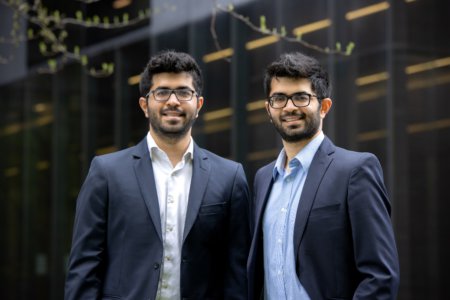
Starting an online business isn’t easy. Starting one in the midst of a once-in-a-lifetime pandemic, when entire cities went into lockdown and supply chains went unchained, is harder still.
Daniel Bernal Bachiller knows this well. His first business idea with his business partner, Tingting Miao, right out of EDHEC Business School, crashed almost as soon as it began.
He had an MBA. Didn’t it teach him how to pandemic-proof a fledgling online business?
“To tell you the truth, the MBA did not give me the experience that I required to start a company. So it’s more from an academic point of view, like learning the attitudes to take risks,” he shares with Study International.
“No one can really prepare you to face a customer. No one can really prepare you to pitch your company to get a loan.”
But what an MBA has repeatedly proven to shine at is getting one and one’s business connected to the right people.
Bernal and Miao capitalised on EDHEC Business School graduate network.
That laid the foundation for their next two e-commerce start-ups: Flora Colombia (which ships flowers from Colombia to China) and Ninfa de Colombia SAS (which imports assorted goods from China to Colombia).
“Right now, the flower market is competitive in China. They are receiving flowers from the Netherlands, Africa, the US and even local production in China,” Bernal says.
“For the Chinese market, we found a lack of very premium flowers. Any country can plant roses, but few countries, like Colombia and Ecuador, can plant huge, luxurious flowers — so we decided to focus on that.”

Bernal (pictured on the right) together with Miao (pictured on the left) on the first day of their MBA in France. Source: Daniel Bernal Bachiller
Moving to France: Studying a Global MBA at EDHEC Business School
Growing up in Colombia, Bernal studied economics and public policy at the Universidad de Los Andes.
Soon after, he started working as a Business Intelligence Analyst at Banco de Bogotá, a commercial bank within the country.
Having seen the success of his father, brother, and uncle in entrepreneurship, Bachiller was inspired to embark on a similar journey of his own — and believed that pursuing an MBA would be a great place to start.
“I decided to do my MBA in Europe, at EDHEC Business School. I just wanted a different point of view, so this is what I was after,” Bachiller shares.
“I chose the school because of the track they had in entrepreneurship. The university allowed you to choose between leadership, finance, or entrepreneurship.”
We sat down with the serial entrepreneur (the term refers to people who can repeatedly turn creative ideas into successful business strategies) to learn about the challenges he faced throughout his journey, how he drives sustainability within the flower e-business, and what it’s like to work with his business partner:
How did the Global MBA help you in your entrepreneurship journey?
In every class, you had to come up with a business idea, present it to your peers, and have them provide constructive criticism.
These attitudes taught me to receive criticism, be self-motivated, and embrace other people’s experiences to incorporate them into my business plan, which allowed our business to grow faster.
Share with us the challenges of forming an e-commerce start-up during the COVID-19 pandemic
The pandemic was not only a health issue — it was also a logistic issue.
Countries like China had new procedures to disinfect stuff in customs. Transporting freight from China to anywhere in the world was nearly impossible. It was simply too expensive.
It also affected how the flower industry worked. Many farms had to lay off many workers and the industry was not in good space when we started.
So, how do you start a big business with no tools? Our company was new. We just signed a contract with a logistic company to be able to transport [the flowers].
It took around four to five months to convince the first time that we wanted to do this for real and we have done our homework to be, at the very least, successful in the first shipment.

Miao inspecting the harvest of a supplier in Ecuador. Source: Daniel Bernal Bachiller
What type of flowers does Flora Colombia export?
All of them. We go to the market in China and we do our homework to see in which flowers we have an opportunity.
Right now, the flower market is competitive in China. They are receiving flowers from the Netherlands, Africa, the US and even local production in China.
For the Chinese market, we found a lack of very premium flowers. Any country can plant roses, but few countries, like Colombia and Ecuador, can plant huge, luxurious flowers — so we decided to focus on that.
The same is with other types of flowers. Since China has a huge demand [for flowers], we find products with a high production volume that are of quality and we take that to China.
How do you drive sustainability within the business?
In the flower industry, there are many specialised certifications concerning environmental impacts.
Since the companies are located in most third-world countries, they also have a social impact component. The two main ones are rainforest certification and the flowering culture industry association certification.
These certifications certify that the farm uses responsible ways of farming, land use, and social responsibility.
In the market, some farms have all of the certifications and other farms — for many reasons — choose not to have the certifications.
As a company, we prioritise farms that have these certifications. We wanted to differentiate ourselves from the market. It is also a strategic business decision and social responsibility.

Bernal (pictured in the middle) and Miao (pictured on the right) at the Int’l Floriculture Trade Fair 2022 in Holland. Source: Daniel Bernal Bachiller
Talk us through what it’s like to work with your business partner, who is from China.
In Latin America, trust is something that is very hard to build.
In China, that’s standard in business — you trust people. Our first customer quickly trusted us because I had a Chinese partner.
I was very lucky to meet my business partner during the MBA. We studied, did our MBA project, and completed the entrepreneurship course together, so we had a year of more or less knowing each other before starting the business.
I think the secret ingredient of our company is the multicultural aspect which allows us to be more in line with the market and producer needs. For example, I can communicate better with producers because we share the same culture.
Do you have any advice for international students who are venturing into e-commerce?
Know your markets. We made a huge mistake because we didn’t have enough experience in the market. Then, in the beginning, learning all these lessons can be quite expensive. So I would suggest they have some experience in the market they are looking to grow.










